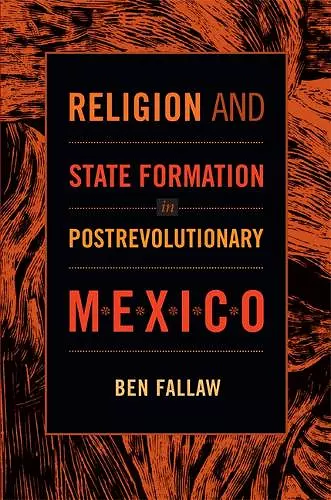Religion and State Formation in Postrevolutionary Mexico
Format:Paperback
Publisher:Duke University Press
Published:21st Jan '13
Currently unavailable, and unfortunately no date known when it will be back

Reshapes our understanding of agrarian reform, federal schooling, revolutionary anticlericalism, elections, and the Revolution's valorization of the Mesoamerican past
This volume offers a powerful argument that Catholics and Catholicism had a more pervasive and impeding influence on postrevolutionary state formation in Mexico than historians have recognized or acknowledged.The religion question—the place of the Church in a Catholic country after an anticlerical revolution—profoundly shaped the process of state formation in Mexico. From the end of the Cristero War in 1929 until Manuel Ávila Camacho assumed the presidency in late 1940 and declared his faith, Mexico's unresolved religious conflict roiled regional politics, impeded federal schooling, undermined agrarian reform, and flared into sporadic violence, ultimately frustrating the secular vision shared by Plutarco Elías Calles and Lázaro Cárdenas.
Ben Fallaw argues that previous scholarship has not appreciated the pervasive influence of Catholics and Catholicism on postrevolutionary state formation. By delving into the history of four understudied Mexican states, he is able to show that religion swayed regional politics not just in states such as Guanajuato, in Mexico's central-west "Rosary Belt," but even in those considered much less observant, including Campeche, Guerrero, and Hidalgo. Religion and State Formation in Postrevolutionary Mexico reshapes our understanding of agrarian reform, federal schooling, revolutionary anticlericalism, elections, the Segunda (a second Cristero War in the 1930s), and indigenism, the Revolution's valorization of the Mesoamerican past as the font of national identity.
"Religion and State Formation in Postrevolutionary Mexico should establish itself as a key text in Mexican revolutionary history. The author has done a prodigious quantity of research and organized it expertly, producing an original and convincing analysis of a major theme: Church-state conflict in the postrevolutionary period. The issue permeated Mexican politics, and its exploration opens a window onto a variety of other themes, including state building, education, land reform, gender, ethnicity, violence, and local politics and elections."—Alan Knight, author of The Mexican Revolution
"This important book forces a rethinking of the efficacy and influence of agrarian and cultural revolutions not only in Mexico but throughout the world. In what is nothing short of a massive reappraisal of the pivotal presidency of Lázaro Cárdenas, Ben Fallaw demonstrates how conservative Catholic opposition at the local and state levels consistently obstructed Cardenista reform. Based on his detailed reconstruction of circumstances and events in four very different Mexican states, he reminds us that conditions differed enormously among locales, even between two villages in the same state. His research is blockbuster in every possible way."—Terry Rugeley, author of Of Wonders and Wise Men: Religion and Popular Cultures in Southeast Mexico, 1800–1876
“In this impressively researched, organized, and written work, Fallaw (Colby College) examines one of the major themes facing Mexico in the 1930s—the conflict between the Catholic Church and the state.”
-- J. B. Kirkwood * Choice *
“…the author provides one of the best portraits of how the Mexican state’s anticlericalism, rationalist educational reforms, land reform, anticlerical agitation, and indigenism were intertwined and thus galvanized opponents.” -- Edward Wright-Rios * American Historical Review *
“Fallaw’s study proves utterly striking, as his study details in multiple ways clerical and governmental failures to serve the basic needs of an impoverished and poorly educated public. His study reveals some of the ways that widespread cultural ignorance of the complex material cultural needs of the Mexican population persisted during the postrevolutionary period.” -- Marjorie Becker * Catholic Historical Review *
“[Fallaw’s] careful marshaling of evidence and his sound analysis make clear why agrarian reform and changing religious practice and devotion were extremely difficult to achieve.” -- Linda B. Hall * Hispanic American Historical Review *
"Overall, Religion and State Formation in Postrevolutionary Mexico is one of the most important books on twentieth century Mexico of the last ten years. Original, thoroughly researched, and ambitious in scope, the work is a must read for those interested in revolutionary Mexico, modern Catholic sensibilities, or the overlap of politics and religion." -- Benjamin Smith * The Americas *
“Ben Fallaw’s extraordinary new book, Religion and State Formation in Postrevolutionary Mexico, ostensibly explains religious violence in four Mexican states: Campeche, Hidalgo, Guerrero, and Guanajuato. In the process, however, Fallaw tells us much more. Challenging a number of widely held assumptions about this period, he describes convincingly how and why the revolutionary project failed in the countryside.” -- Stephanie Mitchell * The Latin Americanist *
"This is a superbly researched and enduring contribution to the history of the Mexican Revolution and Latin America’s political and religious history. For the many researchers who continue to ponder how Mexico’s regions responded to national institutions and discourses, Fallaw’s book will be indispensable." -- Thomas Rath * Journal of Latin American Studies *
"This is a prodigiously researched work that weaves together the specificity of four cases within a satisfying analytic framework. It is likely to encourage further work on religion and state formation." -- Jeffrey Mosher * EIAL *
ISBN: 9780822353379
Dimensions: unknown
Weight: 481g
360 pages